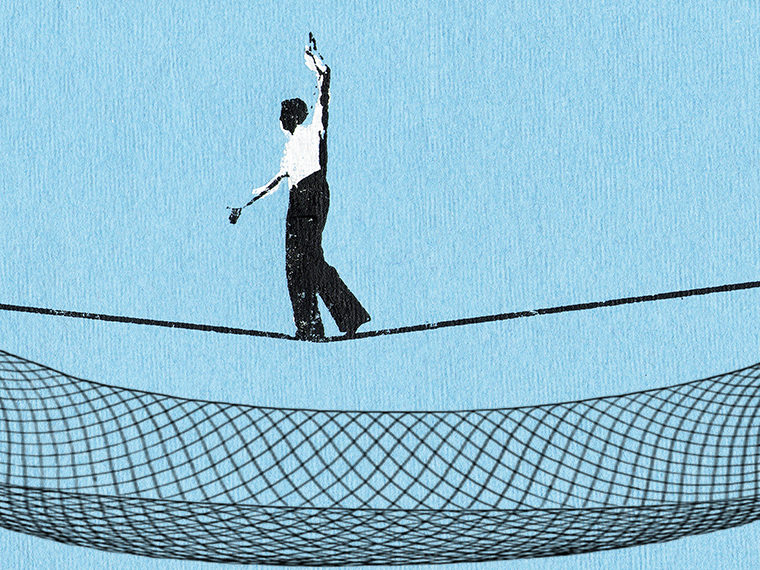Nudge to improve preventive medicine performance didn’t work – and yielded discontent
If there’s a work cohort we all have a vested interest in keeping happy and healthy, it is primary care doctors. By one estimate published in 2021, the U.S. is expected to be short by between 17,800 and 48,000 primary care physicians by 2034, and nearly one-third of current primary care docs reported being burned out.
Talk to any primary care physician for more than a minute and you will likely get an earful about crushing workloads and frustration over too-short appointment times during which they often are tethered to a tablet or laptop, recording everything to satisfy regulatory and insurance reporting requirements.
All of that raises the stakes on how to guide primary care doctors toward best practices in a way that does not add to their discontent.
Opt In to the Review Monthly Email Update.
Against this backdrop, research forthcoming in the Proceedings of the National Academy of Sciences finds, from a field experiment, that a nudge that compared physicians with one another undermined their job satisfaction and failed to improve their performance.
In a five-month study involving 199 primary care doctors and 46,631 patients in the UCLA Health system, physicians were sent feedback about how their job performance — specifically, the track record of their patients in scheduling recommended preventive care tests — compared with the performance of other doctors. The physicians who received this peer comparison information reported significantly higher levels of burnout and lower levels of job satisfaction than those who did not receive the peer comparison nudge.
Moreover, the nudge itself didn’t improve the rate at which preventive procedures were scheduled.
Research team: UCLA Anderson’s Joseph S. Reiff, a Ph.D. student, Jana Gallus, Hengchen Dai and Craig R. Fox; UC San Francisco’s Justin C. Zhang, UCLA Health’s Nathaniel M. Pedley, Sitaram Vangala, Richard K. Leuchter, Daniel Croymans and Maria Han; and Central Michigan’s Gregory Goshgarian.
The researchers further found that the negative psychological cost was mitigated when the peer comparison nudge was paired with training to help leaders better support physicians’ job performance and put into proper context the metrics used in the feedback.
While this research focused on primary care physicians, the key findings may offer valuable management insights that transcend industries.
When Peer Comparisons Backfire
The initial focus of the research was to explore whether a peer comparison nudge would compel primary care doctors to get more of their patients to undergo recommended preventive care, such as routine screenings. That didn’t move that performance despite other research that shows that such an approach can work in reducing the over-prescription of antibiotics, improving emergency department efficiency and boosting medical quality of care. The researchers discuss possible reasons for that difference with prior research. Their focus, however, lies in unpacking the negative effects on well-being.
Doctors’ performance was tracked with a “health maintenance completion rate,” which summarizes the share of recommended preventive care measures, such as routine screenings, that a doctor’s patients completed in the previous three months.
The experiment had a control group of doctors who were simply presented with this health maintenance completion rate. Doctors in the peer comparison treatment group were additionally shown a list of the 25 doctors who had the highest completion rates, as well as information about where the peer comparison group doctors personally ranked compared with these “top performers” (hello, peer pressure).
On a scale from 1 (indicating extremely dissatisfied) to 7 (indicating extremely satisfied), doctors in the control group reported higher job satisfaction (5.5) than the doctors in the peer comparison group (5.0). The burnout rating (on a 1 to 5 scale) was higher for those in the peer comparison group (2.5) than the control group (1.9).
A third group received the peer comparison nudge, but they were managed by leadership that had received explicit training to create a supportive and collaborative framework for the “why” behind the metrics used in the comparisons. Among this third group, reported job satisfaction (5.3) and burnout (2.1) were statistically indistinguishable from the levels seen in the control group.
Though the intended 12-month experiment was truncated to five months given the onset of the pandemic, the researchers circled back to doctors four months after the intervention had ended, and they found that the decrease in job satisfaction for the peer comparison group had persisted.
The Role of Leadership
Doctors were also asked to rate how supported they felt by leadership (on a scale from 1 to 5). Furthering the notion that peer comparison nudges may work better when delivered within a positive, supporting context, doctors in the control group (3.5) and those who got the nudge delivered with leadership training (3.6) felt significantly more supported than those who only received the peer comparison intervention (3.0).
Based on qualitative feedback from doctors, the researchers posit that the negative consequences may be a function of doctors being frustrated by the “reductionist” approach to evaluating them on a single metric. Doctors were also upset by the nudge because it pitted doctors against one another in an environment where collaboration is the norm.
The authors share general lessons for managers about the importance of first understanding how a nudge’s design and implementation may be perceived by the target population before scaling their interventions. Their findings should be of interest to all managers eager to harness behavioral science to drive performance and well-being.
“When leaders offer the necessary context and support to accompany a peer comparison intervention, recipients may draw more positive inferences about their leaders’ intent. This can buffer against the harmful effects of peer comparison interventions on well-being,” the authors conclude.
Featured Faculty
-
Jana Gallus
Associate Professor of Strategy and Behavioral Decision Making
-
Hengchen Dai
Associate Professor of Management and Organizations and Behavioral Decision Making
-
Nathaniel M. Pedley
UCLA Medical Center, Primary Care Physician and Health Sciences Clinical Instructor at Olive View
-
Richard K. Leuchter
UCLA Health, Internal Medicine
-
Sitaram Vangala
David Geffen School of Medicine at UCLA
-
Craig Fox
Harold Williams Chair and Professor of Management
-
Maria Han
Chief Quality Officer for the UCLA Health Department of Medicine and Assistant Clinical Professor
About the Research
Reiff, J.S., Zhang, J.C., Gallus, J., Dai, H., Pedley, N.M., Vangala, S., Leuchter, R.K., Goshgarian, G., Fox, C.R., Han, M., & Croymans, D.M. When Peer Comparison Information Harms Physician Well-Being. (2022). Proceedings of the National Academy of Sciences. 119(29), e2121730119. https://doi.org/10.1073/pnas.2121730119






